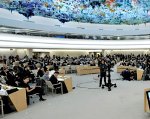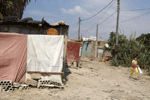Published on Wed, 2016-09-14 16:47
The World Trade Organisation (WTO) should mainstream human rights into all of its activities and issue directives to the dispute settlement panels so that human rights treaty violations are not adversely affected. This is one of the main recommendations highlighted by the UN Independent Expert on the promotion of a democratic and equitable international order, Mr Alfred de Zayas (United States), in his report to the Human Rights Council, which is currently holding its regular thirty-third session in Geneva. "It is high time to mainstream human rights into all trade agreements and World Trade Organisation (WTO) rules and regulations, so that trade representatives and dispute-settlers know that trade is neither a ‘stand-alone' regime nor an end in itself," the rights expert said in presenting his report to the Council on Tuesday (13 September). |
Published on Thu, 2016-09-08 20:32
Due to the lasting impact of the international financial crisis and resulting increase in poverty and insecurity, and especially due to the Government’s extensive austerity policies, Italy faces challenges in many of the areas addressed by the 2030 Agenda for Sustainable Development goal. Even in the one area that has seen a positive trend in recent years, namely, the development of renewable energy, there has been a reversal of the virtuous cycle since 2015. In the absence of a national energy plan, government policies continue to encourage fossil fuels (despite popular opposition), and large infrastructural works with new rules to eliminate environmental controls (introduced through the Stability Law in 2016) and with an increase in soil depletion. |
Published on Thu, 2016-09-08 20:24
Several challenges hinder the implementation of the 2030 Agenda on Sustainable Development in Lebanon. During the UN Conference on Sustainable Development in September 2014 Lebanese President Tammam Salam identified the humanitarian issues caused by the Syrian refugee crisis as one of the greatest challenges to development. It is indeed a significant constraint; yet, one should note that Lebanon was facing a political and socio-economic crisis reflected by a high rate of unemployment and marginalized people, even before the Syrian crisis and the flood of refugees. Therefore, it is worth highlighting that the Syrian war shed light on the structural and systemic problems of Lebanon and aggravated them. To date, Lebanon does not have a national strategy for sustainable development nor a national economic plan nor a poverty reduction strategy. According to the 2014 International Parliamentary Union Secretary General’s annual report: “the Lebanese Parliament reported that the Sustainable Development Initiative was in the agenda of the Public Work Committee between 2009-2010 period. The current political instabilities, however, forced the Parliament to shift its priorities.” The same report indicates that the Parliament has not been informed of the Sustainable Development Goals (SDGs) and has not taken any steps to discuss them. |
Published on Thu, 2016-09-08 20:12
Inequality’s unrelenting rise has been the subject of growing attention that has come, in the last few years, from unexpected quarters. As a recent example, an article appeared on the IMF’s Finance & Development journal, “Neoliberalism: Oversold?” put the spotlight on the negative effects that inequality has on the level and sustainability of growth. The article generated not only wide press coverage, but also a number of responses. Almost in sync with the article, the IMF felt the need to publish an interview with its Chief Economist, Mr. Maurice Obstfeld, clarifying that the policy rethink at the IMF did not represent revolution, but evolution. Needless to say, to many analysts who had closely followed IMF policies for years, the clarification was entirely unnecessary. In fact, critics were quick to comment that the article was only a mild departure from IMF doctrine, not reflected in actual IMF programs, and even reasserted points that continue to be the focus of contention such as the positive growth effects of trade liberalization, privatization and foreign direct investment. Nonetheless the article, reflected wider concern with inequality at an institution that until not long ago considered it an afterthought. |
Published on Thu, 2016-09-08 19:17
Arab NGO Network for Development (ANND) held a seminar to discuss issues related to Business and Human Rights in the context of the Pilot Project for the Promotion of Social Dialogue in the Southern Mediterranean Region. |
SUSCRIBE TO OUR NEWSLETTER







